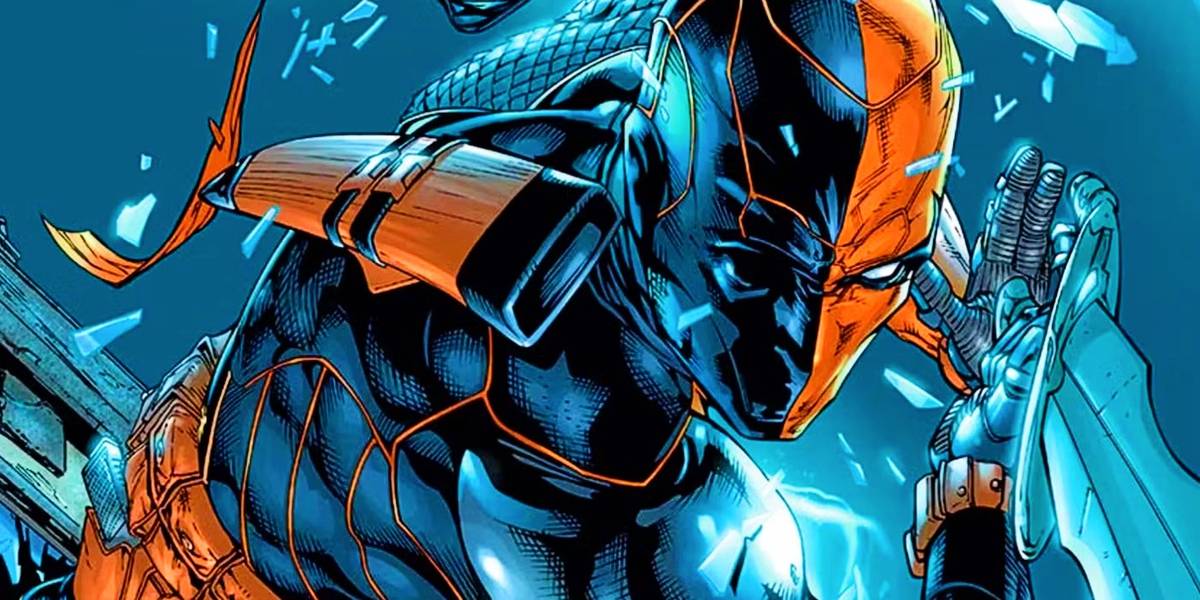[[{“value”:”
Warning, contains discussion of sensitive subject matter.
DC Comics features some of the worst villains in comic history, who think nothing of spilling blood, pulling out all the stops for a bit of emotional or physical torture, and generally crossing any line imaginable. Yet even within that lineup, Deathstroke still stands out; thanks to his involvement with the underage assassin, Terra, during the “Judas Contract” storyline, Slade Wilson will forever carry an unforgivable burden as a character.
According to author Christopher Priest, this is the villain’s defining trait, like it or not. Deathstroke has been a thorn in the Titans’ side for decades, but his DC Universe reputation has varied considerably over the years. He’s taken turns as a stereotypical, mustache-twirling villain, and a character bordering more on ‘anti-hero’ than rogue, and generally speaking, has achieved a great deal of complexity since his introduction.
Yet it isn’t his willingness to kill for cash that represents the real shadow hovering over the character. That would be Deathstroke’s actions in the classic “Judas Contract” story, and his physical relationship with 15-year-old Terra, a crime which rightfully still define him.
Deathstroke’s Involvement With Terra Is An Inescapable And Irredeemable Part Of The Character’s Backstory
“Judas Contract,” From Tales Of The Teen Titans #42-45; Written By Marv Wolfman; Art By George Perez
Deathstroke is a polarizing figure, and not simply because he’s an assassin for hire. The DC Universe is littered with villains who kill for money or just to satisfy a sadist streak. Instead, Slade’s physical relationship with the underage contract killer, Terra, will always be a defining point for the character. Terra became the central figure in his revenge plan to get back at the Teen Titans, still blaming them for the death of his son, Grant Wilson (Ravager). She was meant to infiltrate the team, betray them to Slade, and he’d essentially take matters into his own hands from there.
[The Terra storyline] is a shadow that Slade Wilson can never outrun, nor should he be given the chance to leave it behind.
The plan itself, while bad news for the Titans, was never the issue. Instead, featuring the teenage Terra in a slinky dress with a cigarette, while Slade lounged in bed unclothed, sealed Deathstroke as a completely monstrous character. Not only did he manipulate and use Terra for his own revenge, but he also exploited her sexually while doing it. Terra’s willingness to participate doesn’t erase or excuse the behavior, and it is a shadow that Slade Wilson can never outrun, nor should he be given the chance to leave it behind; regardless of anything else he does, the “Judas Contract” is part of him.
Even DC’s Writers Acknowledge That Slade Wilson Is Fundamentally Unforgivable
And The Best Know It Should Stay That Way
In the 2019 interview, Christopher Priest, author of DC’s Rebirth-era Deathstroke series, made no qualms about calling Deathstroke’s involvement with Terra exactly what it is, “reprehensible, explaining:
Deathstroke manipulating a young girl is reprehensible. It is kind of unsurvivable in terms of character—you really can’t soft-pedal the behavior and continue to root for Deathstroke. Any attempt to rationalize the behavior just blows up in your face. Deathstroke’s choices are indefensible.
Priest was clear that Slade’s “choices are indefensible” while simultaneously acknowledging that some people still miss important facets of the character to jump straight to damning him. Likewise, they often skirt past everything the original story was meant to say about Terra herself. In other words, Deathstroke can be unforgivable for exploiting Terra while, at the same time, the story itself was still meant to have nuance that gets lost in translation.
Related
Deathstroke Officially Returns, As DC Explains How He’s Alive and Where He’s Been
Readers were left with questions about what happened to Deathstroke between the events of Dark Crisis and his return in Titans. Now, we have answers.
It still boils down to the blatant fact that Slade shouldn’t be made into a hero. Rebirth’s take on Terra and Slade’s relationship was watered down in comparison to the original, which Priest laments as having taken the edge off of a story that shouldn’t have ever been softened. It focused more on Slade’s manipulation and, consequently, what that meant for Terra, while shifting the physical aspect into a kiss. Even if that take is slightly less jarring than the original “Judas Contract,” depiction, it doesn’t change who Slade is and always will be: a bad guy who does bad things.
Deathstroke Can’t Wash Out The Stain The “Judas Contract” Left Him With
Slade Wilson’s Forever Tarnished Name
Being physically involved with a minor has landed Deathstroke with the “pedophile” label since the “Judas Contract’s” debut. For many, it might be the first thing they think of when Slade Wilson comes up. According to Priest, that isn’t quite right. Slade’s involvement with Terra was for revenge against the Titans. He used and manipulated her for that purpose, not due to some overarching attraction to minors. He still did what he did, the actions still took place, and thus he isn’t “fully exempt” as a result. It isn’t wholly accurate, but he shouldn’t be distanced from it.
Related
After 40 Years, Deathstroke Is Facing the Consequences For One of DC’s Most Controversial Stories
Deathstroke has put the Titans through hell for years, but after their latest conflict, the team is preparing to make Slade Wilson pay for everything.
Both the original telling and Priest’s Deathstroke run fail to hold Slade truly accountable for what he did to Terra. He’s never fully reckoned with it or faced real consequences. Naming him a pedophile may fail to take into account the specific circumstances of Slade and Terra’s entanglement, but nothing could (or should) erase that it happened at all. Both Priest and George Pérez, one of the original “Judas Contract creators,” agree that Terra was no innocent lamb in her own right, but Slade still chose to manipulate and exploit a minor, even if that minor was a mercenary.
Terra’s Faults As A Character Shouldn’t Be Used To Excuse Deathstroke’s Actions
Her Lack of Heroism Doesn’t Redeem Slade Wilson
The Judas Contract may be an unwashable stain on Deathstroke’s history, but it wouldn’t exist without Terra herself. She comes pre-equipped with her own set of problems, though that does not absolve Deathstroke of any of the choices he made as a grown adult in that situation. She is doubtlessly a victim, and by virtue of her age there is no doubt or denial that Slade Wilson took full advantage of her for his personal ends. It still wouldn’t be right to touch on the subject without diving into the girl who infiltrated the Teen Titans on the assassin’s behalf.
Terra was not an unwilling party to the actual Judas Contract plan, and she was never going to be one of the good guys.
Terra, or Tara Markov, can manipulate and control rock and earth (as her codename implies) and is the half-sister of Outsiders member, Geo-Force. Deathstroke brought her in as a double agent to infiltrate and ultimately betray the Titans team, and capitalized on Terra’s already-prominent hunger for power and her willingness to kill. According to Priest, “painting Terra as a saint is wrong and stupid.” She is a villain in her own right, never intended to be redeemed; Terra was not an unwilling party to the actual Judas Contract plan, and she was never going to be a hero.
Deathstroke’s Growing Popularity Doesn’t Redeem Him
He Will Always Be A Villain
Despite the earned controversy that always follows him, Deathstroke continues to grow in popularity. He appears across all forms of media, including multiple TV shows, animated films and series, and a slew of comics prominently feature him. There’s a great deal of nuance within his continuously expanding appearances, too, as he’s sometimes written. He’s sometimes written as more of an antihero fighting for his family or relying more on his (admittedly hard to define) moral code to make choices. It is exceedingly difficult to reconcile that image with the same man who took advantage of Terra for his own gain.
This is, in large part, the nature of culture’s ongoing fascination with “anti-heroes” and “dark heroes,” and villains who readers can root for because they are battling against some greater threat, some worse villain. That, combined with the increasing distance from the “Judas Contract” storyline, the details of which can be danced around in future arcs, has allowed Deathstroke to remain a prominent figure in the DC Universe, despite the unforgivable sin at the heart of his most infamous moment as a Teen Titans adverdsry.
Deathstroke did terrible things, and those terrible things should be his unshakeable shadow.
That isn’t to say Deathstroke is undeserving of the spotlight, exactly, only that growing popularity should not free him from his past actions. His actions with Terra are part and parcel to who he is, and that will always mean he’s a villain. Distancing him from that or writing the character as if it never occurred is a major disservice to fans, the character of Terra, and to Slade himself, not to mention the very real-life issues that exploited youths and minors continue to face worldwide. In short, Deathstroke did terrible things, and those terrible things should be his unshakeable shadow.
Source: Multiversity Comics, Christopher Priest interview
“}]] Deathstroke can’t escape his worst decision. Read More

